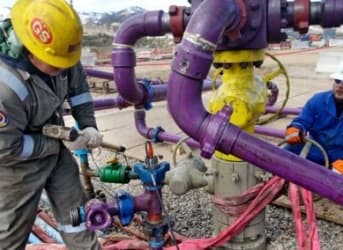As Great Britain considers its future and the role that shale gas may play, it’s worth trying to understand the economic impact that greater shale development would have. There is little doubt that there will be some environmental costs to shale development. Maybe those costs will be great, maybe they will be small.
But studies have shown that those costs are controllable largely based on local regulations. The benefits of shale extraction though are not as easy to assess. In the wake of recent set-backs to the British opportunities in shale extraction, it’s worth looking at economic data to try and gauge those benefits. Most countries in Europe lack the proper geography for shale production, so the best example to turn to for an idea of the economic effect from shale production for Britain is the U.S.
Economists studying natural resource extraction have found that shale gas can impact local and national economies in five ways: (1.) local employment rates, (2) local per capita GDP, (3) local housing prices, (4) government budgets, and (5) national-level natural gas prices. There have been a number of studies related to these issues, and those studies combined with data analysis show that Britain has much to gain from shale gas extraction. Related: Why Geothermal Energy Will Remain A Small Player
At the local level, employment growth is much stronger in areas that produce more oil and natural gas. In one study of the United States for instance, the states with the fastest oil and gas production growth have also seen the strongest employment gains over the last decade. Analysis of data in the U.S. suggests that states that embraced fracking saw employment gains of as much as 3.4% of the population as a result of that decision.
Moreover, the benefits from producing large amounts of gas are not isolated to a specific region of the country. Instead, as any economics student knows, when more of a commodity is produced, the supply increases and the price falls. That falling price acts as a small tax cut for every citizen that buys the product. A large 25 percent fall in oil prices as a result of oversupply, like the world is seeing now, leads to as much as 1 percent in extra GDP growth. The U.S. Congressional Budget Office found that shale natural gas extraction in particular has an exceptionally strong influence on dampening the cost of that commodity in the U.S. as a result of the difficulty and cost of international gas transportation. Related: EIA Data Still Doesn’t Add Up
Local housing prices are a more mixed picture when it comes to shale development. For houses that rely on wells and local groundwater, fears about water safety often lead to lower property prices. However, studies have found that for houses that use piped water, local property values actually rise. This is a result of the option value created by local gas development. For some homeowners, this development leads to very large lease payments by companies extracting gas on their property. This extraction improves property values drastically in the area, especially when new techniques like horizontal drilling are used, since this minimizes the equipment that a homeowner has to have on their property.
The economic effects of shale oil can be hard for many people to understand, especially when they do not work in that industry. But those effects are real. A study by an economist at the U.S. Federal Reserve showed that the average U.S. county which increased its natural gas production saw a corresponding increase in real annual wages per capita of more than $1,800. This translated to an average pay raise of 5.8 percent for the typical person living in the area. Related: Top Shale Takeover Targets
Population growth was also much stronger in these counties – rising nearly 14 percent over the course of a decade. This increased population, helps to enable other local industries to remain strong even as the natural resources sector employment increases. These effects overall can range from small to massive depending on the size of the natural resources available for extraction. For example, the Texas resource basin known as The Eagle Ford Shale is projected to have a total economic impact of nearly $90 billion by 2022 and supports more than 125,000 jobs. This benefit is driven by billions of dollars in spending by corporations looking to harness natural resources in the area.
The final benefit from shale gas relates to government budgeting. The U.S. Congressional Budget office studied the economics behind shale production and found that government budgets at the Federal level will see an extra 1 percent in revenue annually by 2020 as a result of shale production. The results are even stronger at the state level. Within the U.S., the average state income tax is roughly 50 percent lower in states with significant oil and natural gas production.
Overall, the costs for shale production may be significant from an environmental standpoint, but if the benefits accrued in the U.S. are any indication, the UK as a whole could see considerable economic benefits from shale production as well. From more government revenues and improved property values to lower unemployment and higher per capita income, shale production certainly has the potential to help boost the British economy if it eventually achieves widespread acceptance.
By Michael McDonald for Oilprice.com
ADVERTISEMENT
More Top Reads From Oilprice.com:
- Current Oil Price Slump Far From Over
- Could Armenia Be The Next Ukraine?
- How U.S. Shale Is Refusing To Bow To Saudi Pressure

















